Tengchong, Yunnan Province, China; December 7, 2017
You know by now, from Parts 1 & 2 of this saga, that this story centers around a saddle blanket, from Mongolia, presented to my father from Chairman Mao Tse-tung in September 1945, in gratitude for getting him out of Chongqing alive.
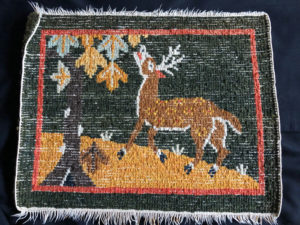 The most important part of the blanket is the image of a deer. He is reaching upward with his neck toward a tree branch, trying to nibble a leaf just out of reach — a moment of longing and promise.
The most important part of the blanket is the image of a deer. He is reaching upward with his neck toward a tree branch, trying to nibble a leaf just out of reach — a moment of longing and promise.
For years, this blanket hung in our den on the back of a small rocking chair where I always sat as a little boy. I was fascinated by it, and I worried for the deer. I asked my mother, “Will he ever reach the leaf?” She smiled and said, “Someday, perhaps.”
This past week, as we gave the blanket back to the Chinese people after more than 70 years of our stewardship, I have thought of this more and more.
Over those decades, the friendship of our two peoples has been tested by wars and hardships, and torn by terrible conflicts of ideology and interest. Another war, in Korea, pitted American troops against Chinese troops. Allies became enemies, casualties in the struggle between Communism and the West. Today, with Mao gone, China rising, and America in a state of re-definition, now what does this blanket mean?
I think of China as the deer and America as the tree.
The deer, occupying most of the frame, is full, vigorous, and expansive, one hoof lifted in an energetic and ambitious pose. But for all his strength, the leaf is still out of reach. The tree defines its boundaries. It is only partially visible, but with all its leaves, obviously very fruitful.
The deer yearns for what the tree possesses. He depends on the tree. The fact that the tree also depends on the deer is implied — they are made of the same colors — but the nature of that dependence is not so obvious.
Here, I am not speaking about economic ties but of a spiritual stake, the kind that one people might have in another — as Americans have with the English and French, with West Africans, and the native tribes of our continent — a stake forced on us by history and inescapable, no matter how we may think of ourselves and them, whether we like it or not.
How can this relationship be made clearer? What if there was some way to illuminate this bond? What if the tree bent down a little so that the deer could feed? Might the tree discover its purpose? Might the deer discover its peace?
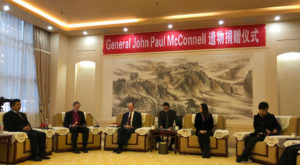 Enter with me the War Museum in Tengchong. Its ceremonial room is the sort you would expect in official China, with overstuffed armchairs and doilies, side-tables with small pots of tea and, in the background, a large landscape scroll. Unexpectedly, a banner surmounted the entire wall. It reads, “General John Paul McConnell,” in English and Chinese.
Enter with me the War Museum in Tengchong. Its ceremonial room is the sort you would expect in official China, with overstuffed armchairs and doilies, side-tables with small pots of tea and, in the background, a large landscape scroll. Unexpectedly, a banner surmounted the entire wall. It reads, “General John Paul McConnell,” in English and Chinese.
The deputy mayor and the local Communist Party secretary were there, along with Madam Zhang Wu Zhen, the daughter of a heroic local leader during the Second World War. Our translator, Colonel Ma, was there, and several other of our sudden friends. Together, we had banqueted wonderfully the night before, with toasts and counter-toasts, in bewildering and carefully prescribed order.
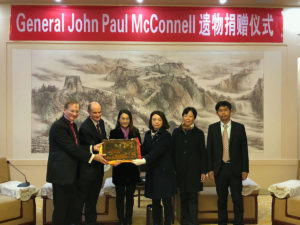 I have never been treated with so overwhelming a display of affection and gratitude from people I had never met. There were warm speeches, in order, and gifts exchanged, in careful balance. My brother, Bruce, and I gave appropriate remarks. His focused on the necessity of international agreements, on a global partnership for sanity. Mine centered on the opportunity at hand for reconciliation and deeper relationship.
I have never been treated with so overwhelming a display of affection and gratitude from people I had never met. There were warm speeches, in order, and gifts exchanged, in careful balance. My brother, Bruce, and I gave appropriate remarks. His focused on the necessity of international agreements, on a global partnership for sanity. Mine centered on the opportunity at hand for reconciliation and deeper relationship.
I was called to speak of these things, I told them, as a Bishop of the Church, sent not only to Christians but to all people as an ambassador for Christ and a minister of reconciliation.
Bruce and I were both a bit nervous about that part of my speech. Official China can be a bit sensitive to matters of religion. We sent Colonel Ma a draft in advance, suggesting that he could amend any part he thought might be awkward or inappropriate. His response was clear, “Your speech is perfect, sir.” I have since learned that his translation followed my text exactly.
After the ceremony, there were many group photos, an obsession in China. Our little blanket was proudly at the center of everything. “Such a small leaf,” I thought. “Such a large and lovely deer. Why should they care so much about his reaching this?”
The museum held the answer. It documented the suffering of millions of people under foreign enslavement, the years of brutal occupation, martial law, war crimes, and “comfort women” — a compendium of human cruelty. Yet all around were testimonies to the liberators, especially Americans like my dad who flew the “Hump,” who trained and supported, and fought and died with Chinese troops.
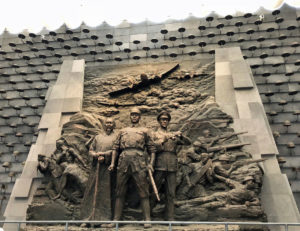 Our VIP tour ended in the museum’s Great Hall, a vast space at the front entrance, where a monumental bronze sculpture depicts three figures in the foreground — a Chinese civilian official, a Chinese officer, and an American general — while in the background, American C-47s and B-24s roar out of the mountains. Around them, mounted on the walls, are more than 2,000 helmets of Allied troops who gave their lives.
Our VIP tour ended in the museum’s Great Hall, a vast space at the front entrance, where a monumental bronze sculpture depicts three figures in the foreground — a Chinese civilian official, a Chinese officer, and an American general — while in the background, American C-47s and B-24s roar out of the mountains. Around them, mounted on the walls, are more than 2,000 helmets of Allied troops who gave their lives.
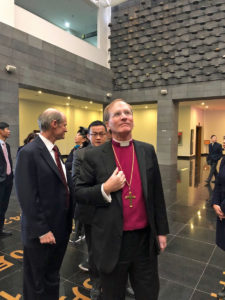 I understood, in that moment, that the price of this friendship has been paid in blood. When my hosts greet my brother and me, they greet those who gave their lives more than 70 years ago. They are deeply moved that we have not forgotten what they have always remembered. When their eyes well up at the airport as they see us off, when they say they want us to come back, they are not only speaking for the deer, they are speaking for the tree.
I understood, in that moment, that the price of this friendship has been paid in blood. When my hosts greet my brother and me, they greet those who gave their lives more than 70 years ago. They are deeply moved that we have not forgotten what they have always remembered. When their eyes well up at the airport as they see us off, when they say they want us to come back, they are not only speaking for the deer, they are speaking for the tree.
There is something very deep in this for us, both as Americans and as Church. Saint Paul is always clear that our identity as members of the Body of Christ is always to be found in each other — that the secret to our own existence lies in the calling of someone else. Put simply, we need one another. In that great official room, as I spoke of the reconciliation won in Jesus Christ, I saw in the eyes of those who listened, one of the most attentive audiences I have ever faced, nodding their heads, feeding on the Word, knowing that they were now tasting something that they had been hoping for all these years. I wondered, how many years has God been preparing the hearts of this people for this? And how much have I yearned for them without even knowing it?
